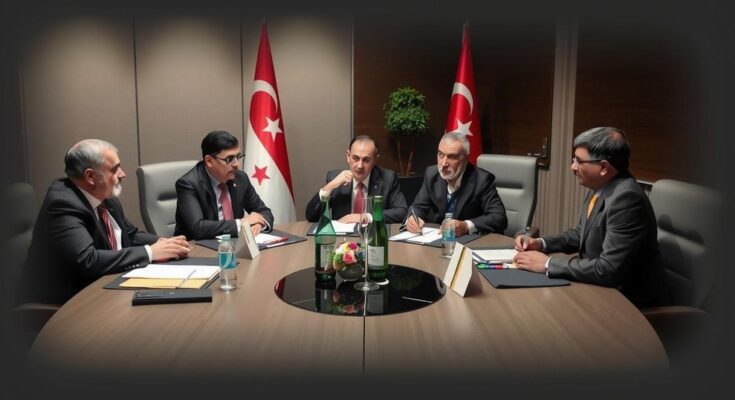Egyptian President Al-Sisi stresses Syria’s unity, while Turkish President Erdoğan advocates for reconstruction efforts in the country. Syrian opposition leader Bader Jamous calls for transitional justice, and Russia weighs in on maintaining state institutions. France re-establishes diplomatic ties in light of the changing political landscape.
Egyptian President Abdel Fattah Al-Sisi has underscored the vital importance of Syria’s unity and territorial integrity during a recent phone conversation with Cypriot President Nikos Christodoulides. He advocates for a comprehensive political process that embraces all Syrian demographics. In a parallel development, Turkish President Recep Tayyip Erdoğan called for international collaboration for Syria’s reconstruction, stressing the imperative to combat terrorism for national security and stability. He particularly noted Turkey’s military efforts against Kurdish factions deemed as threats by Ankara.
On the Syrian opposition front, Bader Jamous, head of the Syrian Negotiation Commission, articulated the necessity of transitional justice and the continued pursuit of legal accountability for the regime of former President Bashar Al-Assad. During a UN Security Council session, he emphasized the spirit of Resolution 2254 as a guiding framework for achieving the aspirations of the Syrian populace and advocated for a national transition government that represents every societal segment. An inclusive conference for drafting a new constitution and organizing fair elections was also proposed.
Internationally, Russian representative Vasily Nebenzya highlighted the proximity of Israeli forces to Damascus and urged that the Syrian government maintain its state institutions, while also calling for the lifting of sanctions on Syria. Meanwhile, UN Special Envoy Geir Pedersen emphasized that tangible progress towards a political transition is essential for attracting the economic support necessary for Syria’s recovery. Reports indicate that over 70% of the Syrian population requires humanitarian aid due to a critical shortage of essential supplies.
France has also re-engaged with Syria, dispatching diplomats to meet with representatives of the country’s transitional authorities. They have urged a commitment to an inclusive political transition and have reopened their embassy in Damascus after a 12-year closure, signifying a renewed focus on Syrian collective security issues, particularly against ISIS and other extremist groups.
The ongoing situation in Syria has prompted multiple international actors to weigh in on the nation’s future following years of conflict. President Abdel Fattah Al-Sisi of Egypt emphasizes the need for unity while Turkish President Erdoğan highlights reconstruction efforts post-Assad. The Syrian opposition insists on transitional justice, while Russia and the UN focus on supporting state institutions and facilitating humanitarian aid. France’s recent behind-the-scenes diplomacy marks a significant re-engagement with Syrian politics, signaling a complex interplay among regional and global powers in determining Syria’s path forward.
In conclusion, the situation in Syria remains complex as various international leaders and organizations advocate for a unified approach to restoring stability and governance in the country. Calls for transitional justice, inclusive political processes, and humanitarian support indicate a collective recognition of the challenges that lay ahead. Continued international dialogue and cooperation are essential to navigate the post-conflict landscape and to ensure the needs and rights of the Syrian people are adequately addressed.
Original Source: www.dailynewsegypt.com




